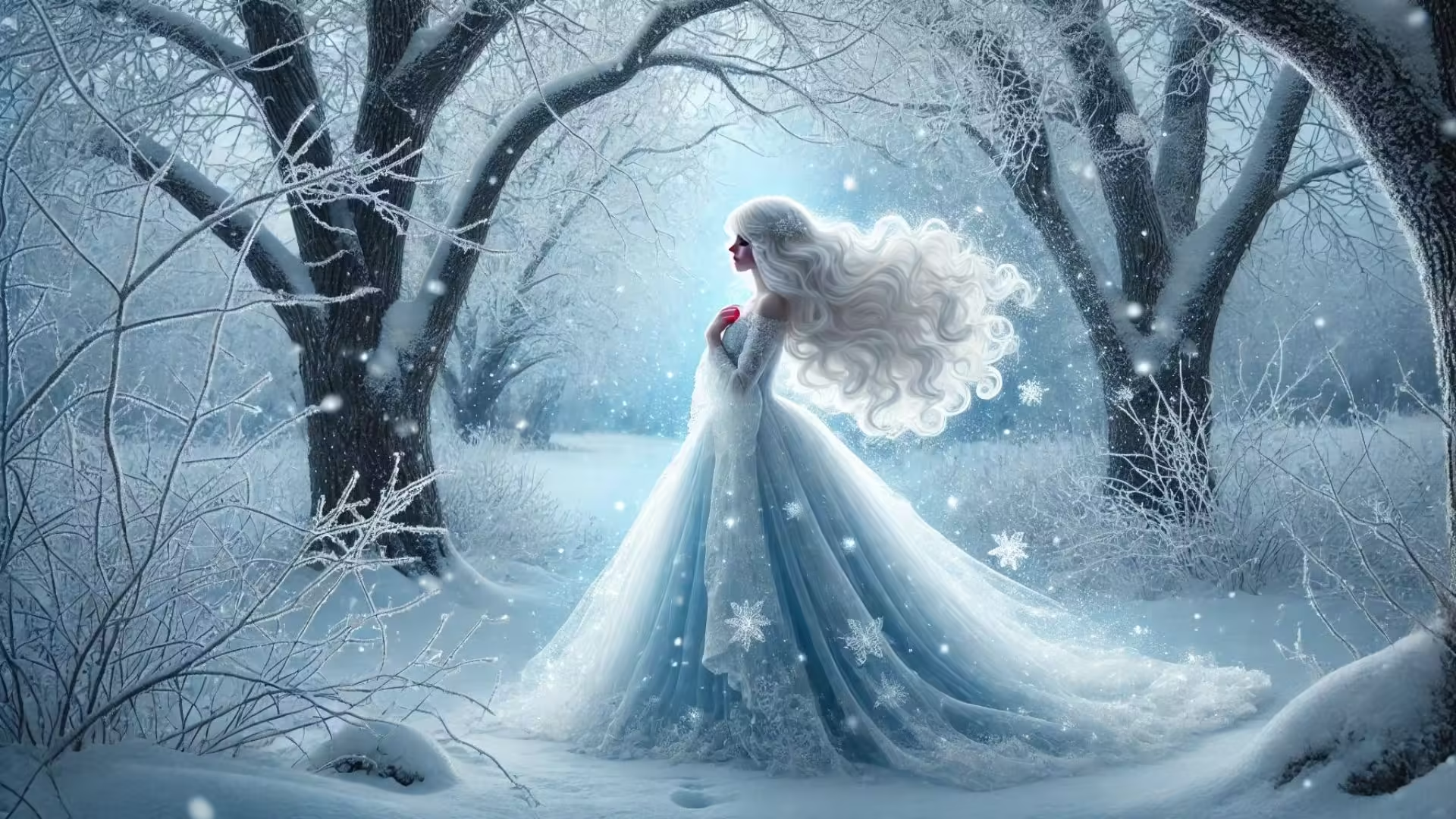The Gist
The Snow Maiden (Snegurochka): A Beloved Russian Legend
Russia’s long, snowy winters provide the perfect backdrop for one of its most enchanting and bittersweet legends: Snegurochka, the Snow Maiden. This timeless figure from Russian folklore has captured the imagination of generations, symbolizing the magic of winter and the fragile boundary between cold purity and warm emotion. Snegurochka is not only a tale of winter wonder but also a story that delves into deep human emotions, exploring what happens when the cold of winter meets the warmth of the human heart.
The Origins of Snegurochka
Snegurochka’s story dates back centuries and has evolved over time, taking different forms in various regions of Russia. However, the most popular version of the legend tells of an elderly couple who longed for a child. One winter’s day, they build a daughter out of snow, and magically, she comes to life. This snow-child, Snegurochka, becomes their beloved daughter, living with them through the cold winter months. But as spring approaches, a conflict arises. The warmth of the sun and human emotion begin to threaten her very existence.
Snegurochka is often depicted as a beautiful, delicate figure with pale skin, icy blue eyes, and flowing white or silver hair, all representing the cold beauty of winter. Her creation from snow ties her to the season, and her story serves as a metaphor for the fleeting nature of winter and the inevitability of change.
The Tale of Innocence and Love
Snegurochka’s life is bound by her nature—she is the embodiment of winter, and as such, she cannot experience the warmth that comes with love and human connection. In one version of the tale, she becomes friends with a group of village girls who enjoy the warmth of springtime bonfires. As Snegurochka watches them, she begins to long for the one thing she cannot have: love.
In her innocence, she seeks the advice of the forest fairy and eventually gains the ability to feel love. But the moment she does, she is no longer protected by her cold nature. Snegurochka falls in love with a young man, but when her heart fills with the warmth of love, she begins to melt. In this tragic moment, she disappears into the air, her icy form unable to survive in the world of warmth and emotion.
This story serves as a powerful allegory, illustrating the idea that some things, like innocence or the natural order of the seasons, cannot coexist with human desires or emotions without being altered forever. Snegurochka’s tale reminds us of the delicate balance between nature and humanity and the consequences of stepping outside of our true selves.
Snegurochka in Russian Culture
While the Snow Maiden’s story is steeped in folklore, she also holds an important place in modern Russian culture. She has become a symbol of winter festivities, often appearing alongside Ded Moroz, the Russian equivalent of Santa Claus, during New Year’s celebrations. Together, they bring joy to children, with Snegurochka depicted as a cheerful, kind-hearted helper who assists Ded Moroz in delivering gifts.
Her dual identity—both a tragic figure from folklore and a beloved character in holiday traditions—shows the enduring power of her story. Snegurochka is a symbol of purity, innocence, and the beauty of winter, but she also represents the inevitable transformation that comes with the changing seasons.
Themes in the Snow Maiden’s Story
The story of Snegurochka touches on several universal themes that resonate far beyond Russian folklore. First, there is the theme of innocence. Snegurochka’s inability to experience love and human warmth until it’s too late reflects the fragile nature of purity and the cost of gaining human emotions. Once she experiences love, her very essence is changed, leading to her tragic end. This speaks to the idea that once innocence is lost, it cannot be regained.
Another key theme is the tension between nature and human desire. Snegurochka’s life is tied to the cold, untouched world of winter. When she tries to embrace the warmth of human love, she is no longer able to exist in her natural form. This can be seen as a metaphor for how human desires and actions can disrupt the natural world, leading to unintended consequences.
Finally, Snegurochka’s story reflects the cycles of life and the seasons. Just as winter must give way to spring, Snegurochka’s existence is fleeting, a reminder that everything has its time and place. Her tale is a poignant reflection on the inevitability of change and the passing of time.
Snegurochka, the Snow Maiden, is a figure of deep beauty and tragic innocence. Her story weaves together the magic of winter with profound themes of love, loss, and the delicate balance between nature and human emotion. From her origins in ancient Russian folklore to her role in modern holiday celebrations, Snegurochka continues to enchant and inspire, reminding us of the transient beauty of life and the inevitable changes we must all face.
In a world where we often try to hold on to things for too long, Snegurochka’s tale offers a gentle reminder: some things are meant to melt away with the coming of spring.
Let’s Talk
So, Snegurochka, the Snow Maiden—such a fascinating figure, right? I mean, the idea of being created from snow, living this fragile existence bound to the cold, and then melting away the moment you feel love… it’s like something straight out of a tragic fairy tale, which, well, it kind of is. But here’s what’s really interesting to me: Snegurochka’s story isn’t just about winter or magic, it’s about this tension between staying in your “safe” space and daring to experience something more, even if it costs you everything.
Have you ever thought about how much we’re like Snegurochka in that way? We all have things that keep us safe—maybe it’s staying in our comfort zone, avoiding risks, or just sticking with what we know. Snegurochka could have lived forever if she stayed in the cold, never experiencing love, never getting close to anyone. But once she allowed herself to feel something, that’s when everything changed for her. It’s kind of like when we step out into the world and take a chance, even knowing we might get hurt or things won’t go as planned. There’s this idea that embracing something new, whether it’s love, a challenge, or a different path in life, changes who we are. But isn’t that the point?
I wonder, what would you have done in her shoes—or snow boots? Would you stay in the safety of your winter world, or would you risk it all for that one experience of love and warmth, even if it was temporary? It’s such a tough call, and it kind of makes me think about how often we’re faced with decisions like that in real life. Sure, we might not be literal snow people risking melting, but we face our own versions of “staying safe” or “taking the leap” all the time.
And what about the whole idea of things being fleeting? Snegurochka’s story is tied so deeply to the changing of the seasons. Winter gives way to spring, and just like that, her time is up. It’s a bit like how everything in life has its season. We’re constantly moving through phases—relationships, jobs, even hobbies—and sometimes, when it’s time to move on, we resist because we want to hold on to what’s familiar. But Snegurochka’s story kind of nudges us to accept that some things are meant to melt away. The end of something doesn’t always have to be tragic; it’s just part of the cycle.
Now, here’s a thought: how often do we try to hold on to things past their season? A job that’s no longer fulfilling, a relationship that’s run its course, or even just habits that we’ve outgrown. Snegurochka’s fate reminds us that letting go, or stepping into something new, isn’t always about losing—it can be about transformation. Sure, it can be scary, but isn’t it better to feel something deeply, even if it means we change in the process?
I’m curious—what does Snegurochka’s story make you think about in your own life? Would you take the leap into the unknown, even if it meant risking everything, or would you hold back, keeping yourself safe but maybe missing out on something incredible?
Let’s Learn Vocabulary in Context
Let’s dig into some of the key words and phrases from Snegurochka’s story and see how they connect to our everyday lives. First up, fragile existence. In the context of the Snow Maiden, this phrase refers to how delicate and fleeting her life is—she’s literally made of snow and can’t survive warmth. But think about how we use this idea in real life. A “fragile existence” could describe a moment when you feel vulnerable or when a situation feels like it could fall apart at any moment. It’s like that time when you’re holding onto something precious—a dream, a relationship, maybe even a project—and it feels like it could slip away if you’re not careful.
Next, we’ve got embodiment. Snegurochka is the embodiment of winter, meaning she personifies or represents the essence of the season. We often use this word to describe someone or something that fully represents a quality or idea. You might say someone is the embodiment of kindness if they’re always going out of their way to help others. It’s about being the physical representation of a concept or feeling.
Now, let’s talk about innocence. In Snegurochka’s case, her innocence is tied to her inability to feel love at first—she’s pure, untouched by human emotion. In real life, innocence can mean many things: a child’s view of the world, or even a person who’s new to something and hasn’t yet been influenced by outside forces. But, like in the story, once innocence is lost, it’s hard to get back. That’s why we often talk about the “loss of innocence” when someone experiences something that changes them fundamentally.
Transience is another big one. Snegurochka’s life is transient—temporary and fleeting—just like the winter season. This word is great for talking about anything in life that doesn’t last forever. You might use it to describe moments that feel special because they’re short-lived, like a sunset or a fleeting opportunity. Recognizing the transience of things can sometimes help us appreciate them more while they last.
Finally, we have metaphor. Snegurochka’s story is full of metaphors, with her melting being a symbol for how love and warmth can change or even end something fragile. We use metaphors all the time without even realizing it. When you say someone has a “heart of gold” or you’re “carrying the weight of the world on your shoulders,” you’re using metaphors to describe something deeper than the literal meaning of the words.
Thinking about these words in your own life, do you ever feel like you’re balancing a fragile existence when you’re facing something uncertain? And what about transience—is there something in your life right now that you’re holding onto, knowing it won’t last forever, but still appreciating it while it’s here?










0 Comments